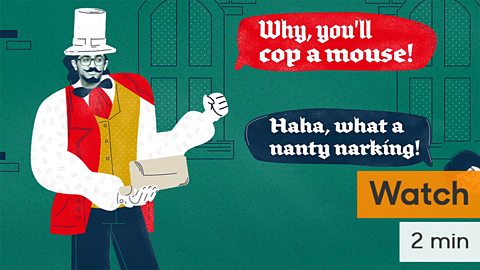Drama essentials
Audience
Think about your audience when you devise drama. Drama needs to entertain and keep their attention. Your drama also needs to be believable - your audience is likely to become disconnected if your story or characters are too unbelievable.
Characters
The story of your drama begins with your character. Ask yourself: How does my character feel, think and react?
Here are two ideas for a character:
- Global superstar - You are a singer, actor and producer and paparazzi follow your every move. You live a glamorous and privileged life, but what are the secrets behind the smiles?
- Journalist - You are journalist who has uncovered a story that will have big consequences and you're about to tell the world. Would your character be confident or scared?
Creating a scene
When you have decided on your character, you need to create a scene.
Here are some ideas for a scene based on the characters above:
Journalist
You're about to appear on the most popular morning TV programme and expose your discovery when you suddenly receive a startling phone call. Who is on the phone? What do they say? How do they make you feel?
You've been working late in the library just double checking a few facts for your article when you notice a menacing looking man watching you. Does your character panic or keep calm? Do you run or confront the man? Maybe you’re being paranoid?
Your article has been published and has been a massive hit. You're receiving job offers from high profile newspapers and magazines and your life is about to change for the better. How do your family react? What do you decide to do?
Global superstar
You've landed a part in a popular soap but you don't get on with the other actors. Should you tell the press the truth or pretend that you all get along?
The press have published some false rumours about you and you're really upset. Your agent has secured a slot on a popular chat show to give your side of the story. Do you accept the offer or decide to lie low? How do you feel?
You've found out that one of the other actors in the soap is planning to leave. You confront them - can you persuade them to stay, or would it be better for everyone if they left?
Developing your scene
When you have a rough idea of your character and scene, think about what your character might say.
Think about using props to make your scene more realistic and interesting. Only use a prop if it is relevant, otherwise it could end up distracting you and your audience. If you decide to use props and costumes, always practise with them first.
Hot seating
Hot seating helps real stage actors get into character, and is a good activity to practise your own drama skills.
Your might choose a crucial moment in a book or play and take on the role of the character in the story at that particular moment. Focus on the emotions that your character is feeling at that moment, eg surprise, excitement, terror, anger, happiness, sadness, confusion.
When hot seating, you must speak, think and feel as though you are that character. If you can think, feel and speak like that character, an audience is more likely to believe you are that character.
Hot seat ideas
- Harry Potter after his first kiss in The Order of the Phoenix
- Juliet in Romeo and Juliet, when Juliet discovers that Tybalt has been killed
- Charlie Bucket just before his trip to the Wonka Chocolate Factory
- Lucy Pevensie after coming back from Narnia for the first time and not being believed
- Hermione Granger at the start of The Deathly Hallows when she puts a false memory charm on her parents and leaves to help Harry on his dangerous mission
- Mowgli when it is decided he must leave his pack and go to the Man Village in The Jungle Book
Improvisation or working from a script?
Improvisation
Taking part in drama doesn't always involve learning lines from scripts - often you'll be asked to improvise. You'll need to be able to think on your feet and 'become' a different character.
This might sound difficult, but you've probably improvised before without realising it, eg in games you used to play as a child. If you ever played pirates, nurses or superheroes when you were younger, you were improvising.
Working from a script
There is much more to acting than just reading a script out loud. If you're nervous, it's tempting to read the lines really quickly, using the same tone of voice all the way through. This isn't very interesting for your audience.
Try to think of punctuation as musical notes telling you when to pause for a breath and then to add emphasis after the pause (for dramatic effect). Don't be tempted to take a little break at the end of each line - the piece might not make sense.
Do keep in mind, however, that a pause of even just a second will likely seem an eternity to you but will be perceived as entirely natural by your audience. Use pauses effectively.
Question
Read the script from Romeo and Juliet below, pausing at the end of each line. Then try again using the punctuation as your guide for when to pause.
Think about how changing where the silence is changes the meaning of what's being said.Which way do you think works better?
JULIET
The clock struck nine when I did send the Nurse;
In half an hour she promised to return.
Perchance she cannot meet him. That's not so.
O, she is lame! Love's heralds should be thoughts,
Which ten times faster glide than the sun's beams,
Driving back shadows over lowering hills.
Therefore do nimble-pinion'd doves draw Love,
And therefore hath the wind-swift Cupid wings.
Now is the sun upon the highmost hill
Of this day's journey, and from nine till twelve
Is three long hours, yet she is not come.
Had she affections and warm youthful blood
She would be as swift in motion as a ball:
My words would bandy her to my sweet love,
And his to me.
But old folks, many feign as they were dead -
Unwieldy, slow, heavy, and pale as lead.
Using the punctuation as your guide makes it sound like a real person thinking aloud
Showing moods and emotions
Being able to recognise where changes in mood and emotion in a script occur is important because you need to convey these changes to your audience. The meaning of the words as well as the punctuation used in the script can really help here (sometimes there are stage directions to help, too, although not usually in Shakespeare).
Actors express emotion through:
- facial expression
- body language
- gesture
- pace, volume and tone of voice
- effective use of pauses and silence
Task
Using these methods, decide how you would express the emotion of anger.
What happens to your face, body and voice when you feel angry? How do you walk when you're in a bad mood? Which gestures do you use to show someone you're angry with them?
- Facial expression - frown, tightly clenched jaw, a tight mouth or even bared teeth.
- Body language - tense shoulders, a swift and purposeful walk, almost like a march.
- Gesture - strong and forceful gestures. Perhaps even clenched fists.
- Volume, tone and pace - either very loud and out of control or very quiet and menacing.
- Pauses - maybe if you're very angry you won't pause often, you'll talk very quickly without giving the other person a chance to talk; or the pauses might be long - a deafening silence.
Now try this with other emotions, eg surprise, excitement, happiness, sadness. See how your body, face and voice change with each emotion.
Mood walks
Another way to practise emotions is to do ‘mood walks’ - put all the elements together to develop a walk that represents each emotion, then greet (or growl at!) people with the appropriate tone of voice.
The stage
When you go to the theatre, you will see how the stage is transformed into a different place or time that the audience can believe in.
This atmosphere is created through:
- backdrop
- lighting
- props
- costume
- sound/music
Task
Question
At the beginning of William Shakespeare's tragedy, Hamlet, guards patrolling the castle wall at night are waiting for a ghost to reappear - they're afraid. Very, very afraid. They think it's the ghost of Hamlet's father who has recently died. They call Hamlet's close friend Horatio to come along to view the ghost for himself.
Imagine that you are setting this stage production in Elizabethan England. What techniques could you use to create the right atmosphere for this scene? Think about:
- backdrop
- lighting
- props
- guards' costumes
- ghost's costume
You need to create an atmosphere that is spooky and frightening.
- Backdrop - grey castle walls. The scene is set in a castle.
- Lighting - dim lighting. The scene is set at night, but the audience need to be able to see the guards.
- Props - swords for the guards.
- Guards' costumes - grey uniforms. The audience needs to recognise that these characters are guards.
- Ghost's costume - no costume - you don't want the ghost to be seen… you just want to hear a booming voice. Sometimes things are more frightening when you can't see them. The booming voice will give the ghost power.
If you were filming this, rather than creating a live stage production, you could use modern technology to change the scene. You would still want to create an atmosphere that is spooky and frightening but you can use different techniques to do this.
Here are some techniques that you could now use to create the atmosphere:
- Backdrop - grey castle walls. The scene is set in a castle. Lots of dry ice could be floating around to make it seem as if it is misty, creating a spooky atmosphere as the characters cannot see very well.
- Lighting - dim lighting will be used but you can light up the actors, eg with torches that they may be holding, so offering more ability to see facial expressions that can be used to convey fear.
- Props - swords for the guards, more props to show the surrounding area, eg trees to suggest the forest outside of the castle, maybe a moat and a bridge to get into the castle. You could even update the swords to guns to make it more in keeping with the current time period. A strong light shining on the stage could be used to represent the moon.
- Guards' costumes - these could be police uniforms. The audience needs to recognise that these characters are guards and this would be a really good representation of that.
- Ghost's costume - this time there could be a ghost as filming techniques will allow the editor to add this. The ghost could be a spooky, floating see-through figure.
More on Spoken English
Find out more by working through a topic
- count3 of 3

- count1 of 3
